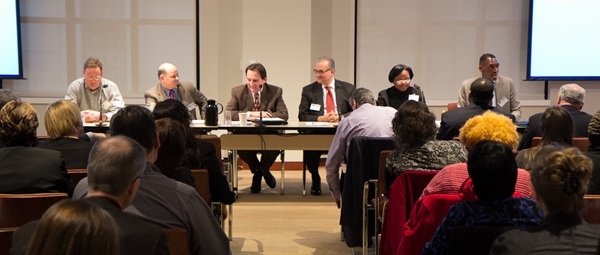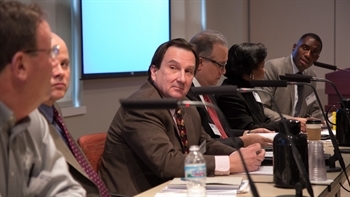
Heather Phillips
 By Katie Buitrago, Woodstock Institute
By Katie Buitrago, Woodstock Institute - February 21, 2013
Part one in a two-part series on single-family rental homes in metropolitan Chicago. Check back soon for part two, on action steps communities and investors can take to ensure single-family rental homes are a community and regional asset.
The foreclosure crisis left many communities with a dilemma: Vacant homes are accumulating quickly at the same time as fewer and fewer people can qualify for mortgages to buy those homes. What can be done with the growing inventory of vacant, abandoned homes? One solution gathering attention is renting out single-family homes, but some communities are wary due to a history with irresponsible landlords, while some investors are struggling to find ways to manage properties effectively. Municipalities, real estate investors, property managers, researchers, and other stakeholders gathered together at the Federal Reserve Bank of Chicago on Jan. 30, 2013, for a forum on Single-Family Rental Strategies: Managing the Next Steps of the Foreclosure Crisis.

Panel discussion at the Jan. 30, 2013 single-family rental housing forum.
The forum, co-hosted by the Regional Home Ownership Preservation Initiative, Home Ownership Preservation Initiative, and Chicago Metropolitan Agency for Planning’s Housing Committee, laid the groundwork of vacancy trends in the Chicago area and beyond, presented current strategies for making single-family rental homes work for communities, and produced recommendations for future action. Metropolitan Planning Council (MPC) also released a white paper summarizing current approaches to managing single-family rentals.
Terry Mazany of The Chicago Community Trust kicked off the forum by highlighting the unevenness of the housing market recovery and the risk of leaving behind low-wealth neighborhoods. He challenged the audience to engage in big thinking that looks beyond homeownership to new ways of stabilizing the Chicago region, noting that we would need large-scale solutions to help communities hit hardest by the crisis.
More and more vacant homes in the region are staying vacant for longer periods of time, Dory Rand of Woodstock Institute explained, which puts them at greater risk of blight and destabilization. Rand showed how mortgage lending standards have tightened significantly over the past 10 years, resulting in a smaller pool of potential home buyers that could re-inhabit these vacant homes.
While renting out single family homes has always been an important part of the rental market, the foreclosure crisis is shifting the business from mom-and-pops to large institutional investors, said Alan Mallach of the Brookings Institution and Center for Community Progress, in the keynote address. An increase in rental demand and a decrease in home purchase demand has led to big investment potential in the rental market. The challenge now is how to encourage investors to invest in their properties instead of milking them for their short-term cash flow. Mallach recommended that communities understand investors’ incentives; find, track and monitor them; create an effective regulatory system; build relationships between city, community and investors/landlords; and provide incentives for stable investors/landlords.

The panel was moderated by Calvin Holmes of Chicago Community Loan Fund, far right.
The panel on local strategies, moderated by Calvin Holmes of the Chicago Community Loan Fund, brought together municipal representatives who are navigating new challenges with single-family rental homes, as well as investors and property managers who explained their models and how they were engaging with their communities. Jafer Hasnain of Lifeline Assets presented their model of purchasing distressed underwater mortgages before the homes become vacant and, instead of foreclosing on the home, Lifeline rents it out to the former owner with structures in place to help them re-purchase the home when their finances stabilize. Mayor Jeffrey Sherwin of Northlake owns and rents out several single-family homes and explained what community assets make him want to invest: geographic proximity, proactive police, and good parks and schools. Andy Geer of Enterprise Community Partners raised concerns about a lack of standards for investors and recommended looking to high-capacity community development corporations with a track record of meeting local needs.
South Holland, a unique community with no multifamily housing, has a Good Neighbor rental registration program that imposes penalties for code noncompliance, said Patricia Mahon of South Holland. Mahon estimates that about 50 percent of the rental properties in South Holland were registered. Bob Roels of Mt. Prospect said that his community requires registration of both multi- and single-family rental housing, as well as vacant homes. One way that Mt. Prospect identifies potential landlords is by tracking which bills are sent to people outside of Mt. Prospect, indicating that the home is not their primary residence. They also highlight landlords with good management practices by convening a landlord expo with neighboring towns.
With information on the vacancy landscape and information on existing single-family rental strategies, participants brainstormed ideas to make single-family rental a community asset. Check back soon for a follow-up blog post with more on these action steps.